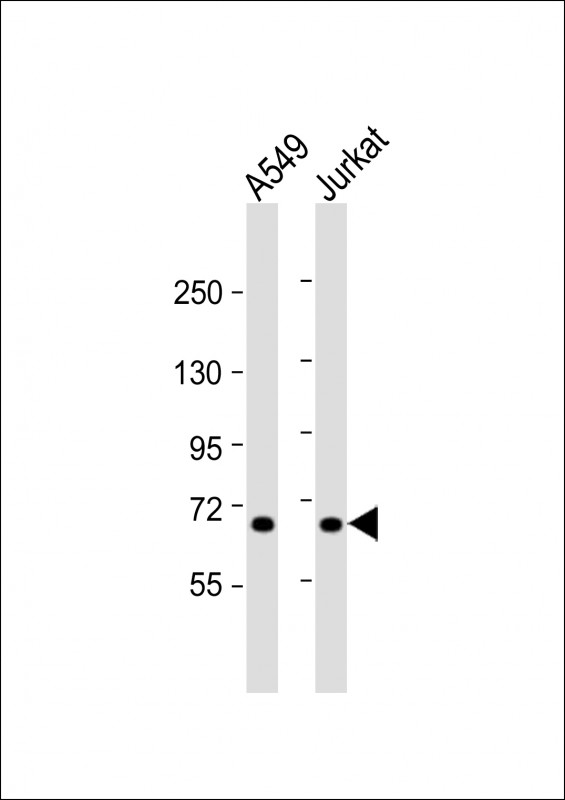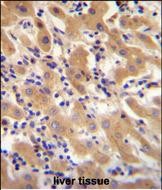

| WB | 咨询技术 | Human,Mouse,Rat |
| IF | 咨询技术 | Human,Mouse,Rat |
| IHC | 1/15-1/50 | Human,Mouse,Rat |
| ICC | 技术咨询 | Human,Mouse,Rat |
| FCM | 咨询技术 | Human,Mouse,Rat |
| Elisa | 1/1000-1/2000 | Human,Mouse,Rat |
| Aliases | Coagulation factor XI, FXI, Plasma thromboplastin antecedent, PTA, Coagulation factor XIa heavy chain, Coagulation factor XIa light chain, F11 |
| Entrez GeneID | 2160 |
| WB Predicted band size | 70.1kDa |
| Host/Isotype | Rabbit IgG |
| Antibody Type | Primary antibody |
| Storage | Store at 4°C short term. Aliquot and store at -20°C long term. Avoid freeze/thaw cycles. |
| Species Reactivity | Human |
| Immunogen | This F11 antibody is generated from rabbits immunized with a KLH conjugated synthetic peptide between 281-307 amino acids from the Central region of human F11. |
| Formulation | Purified antibody in PBS with 0.05% sodium azide. |
+ +
以下是关于SUMO1抗体的3篇参考文献示例(内容基于典型研究主题,具体文献可能需要根据实际数据库检索调整):
---
1. **文献名称**: *"Characterization of a highly specific monoclonal antibody targeting SUMO1-conjugated proteins"*
**作者**: Matic, I., et al.
**摘要**: 本研究报道了一种高特异性单克隆SUMO1抗体的开发与验证。作者通过免疫印迹(Western blot)和免疫沉淀(IP)证明该抗体可特异性识别内源性SUMO1修饰蛋白,且不与其他SUMO家族成员(如SUMO2/3)交叉反应,适用于研究细胞应激反应中的SUMO化动态变化。
---
2. **文献名称**: *"SUMO1 modification of PTEN regulates tumorigenesis by controlling protein stability"*
**作者**: Wang, L., et al.
**摘要**: 通过使用SUMO1特异性抗体,本研究揭示了PTEN蛋白的SUMO化修饰在肿瘤发生中的关键作用。免疫荧光和共沉淀实验显示,SUMO1修饰可增强PTEN的稳定性,抑制泛素-蛋白酶体降解途径,为癌症治疗提供了潜在靶点。
---
3. **文献名称**: *"SUMO1-ylation modulates α-synuclein aggregation in Parkinson's disease models"*
**作者**: Lee, Y., et al.
**摘要**: 该研究利用SUMO1抗体探究了α-突触核蛋白的SUMO化修饰在帕金森病中的作用。实验表明,SUMO1修饰通过调控α-突触核蛋白的聚集和神经毒性,影响疾病进展,为神经退行性病变机制提供了新见解。
---
**注**:以上文献信息为示例性质,实际引用时建议通过PubMed或Web of Science等平台以关键词“SUMO1 antibody”或“SUMO1 conjugation”检索最新或高引论文。如需具体文献,可提供更详细的研究方向进一步筛选。
**Background of SUMO1 Antibody**
SUMO1 (Small Ubiquitin-like Modifier 1) is a member of the SUMO protein family, which plays a critical role in post-translational modification. This process, termed SUMOylation, involves the covalent attachment of SUMO proteins to target substrates, regulating their localization, activity, interactions, and stability. SUMO1 is involved in diverse cellular processes, including nuclear transport, transcriptional regulation, DNA repair, and stress responses. Dysregulation of SUMOylation has been linked to diseases such as cancer, neurodegenerative disorders, and viral infections.
SUMO1-specific antibodies are essential tools for studying SUMOylation dynamics. They enable the detection of SUMO1-conjugated proteins via techniques like Western blotting, immunoprecipitation, and immunofluorescence. These antibodies are designed to recognize unique epitopes within SUMO1. distinguishing it from other SUMO paralogs (SUMO2. SUMO3. etc.). Researchers use SUMO1 antibodies to investigate substrate specificity, subcellular distribution of SUMOylated proteins, and the role of SUMO1 in disease pathways.
Commercial SUMO1 antibodies are typically validated for specificity and sensitivity, though cross-reactivity with related proteins remains a consideration. Their applications extend to both basic research and drug discovery, particularly in exploring SUMOylation inhibitors as therapeutic agents. Overall, SUMO1 antibodies are pivotal in unraveling the complex biology of protein modification and its implications in health and disease.
×